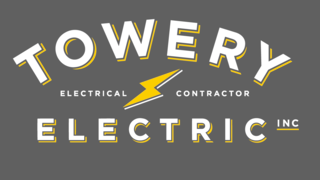By James Lamont, Novato CA
When the 2008 recession dimmed his prospects as a photographer, Alex Towery didn’t let the lights go out on his future. Instead, he found a new calling—one that would not only provide stability for his family but also grow into a thriving company serving Marin and beyond.
Today, as the owner of Towery Electric in Novato, Towery leads a team of 13 skilled electricians, combining craftsmanship with cutting-edge technology. Just as importantly, he has become a respected voice in the local building community, mentoring the next generation and helping elevate the trades. His story is about resilience, vision, and the power of building something that lasts.
From Creativity to Construction
Towery grew up in the East Bay and studied art history and photography at Humboldt State. In 2005, he moved to Marin County to pursue a creative career. But when the recession struck, the photography jobs slowed to a trickle. Towery needed a new path.
“I figured even if you have a business or not, people always need electricity,” he recalled. “Whether the economy is booming or not, there’ll be work for an electrician.”
Encouraged by friends in the trade, he began apprenticing at a small shop in San Rafael, taking night classes in electrical work, and saying yes to every opportunity to learn. He worked days on job sites, evenings in school, and weekends on side projects with a contractor friend. At the same time, he and his wife were starting a family. It was exhausting, but Towery’s determination never wavered.
That hard work eventually paid off: he earned his journeyman’s license, then his contractor’s license, and by 2013, he had incorporated Towery Electric. Six months later, with a handful of loyal clients and a leap of faith, he went out fully on his own.
Building Towery Electric with Purpose
From day one, Towery wanted his company to reflect the values he believed in as a worker: respect, opportunity, and growth.
“I planned on doing things differently than what I’d seen at other companies,” he said. “I wanted to give my employees the opportunities I always wanted as an employee.”
Over the past decade, Towery Electric has grown into a trusted name in Marin, handling everything from residential wiring to advanced lighting control systems. The company is based in Bel Marin Keys, but its reach extends across Marin, San Francisco, and Sonoma counties—and occasionally into the East Bay for special projects.
With 13 employees and a steady pipeline of work, Towery attributes the success not to fast expansion but to steady, thoughtful growth. “The best way to grow is organically,” he explained. “I don’t ever want to hire too many people at once, only to let them go when the economy shifts.”
This careful approach has created a loyal, stable team—something Towery values as much as any contract. “My passion at this point is building a team of people who can get along and are happy at work,” he said. “That’s just as important to me as the work itself.”
A Mentor and Leader in the Trades
Towery’s impact extends beyond his own business. He has become a leader in Marin’s construction community, serving on the boards of both the North Bay NARI (National Association of the Remodeling Industry) and the Marin Builders Association.
He also volunteers as a guest instructor with the North Bay Construction Corps, a hands-on program that introduces high school students to careers in the trades. In the classroom and the woodshop, students learn everything from welding and framing to plumbing and electrical systems. Towery has not only taught classes but also hired graduates into his company, giving them a strong start in the industry.
“It’s a great class for youth who want to get into the trades,” Towery said. “Over the years I’ve met a number of great candidates. Some of them we’ve hired, and they’ve grown with us for years.”
His commitment goes even further: Towery often pays for his employees’ continued education if they show motivation and drive. “If they’re willing to learn, I’ll cover their schooling while they work,” he explained. “That combination of learning while working is the best path.”
Blending Tradition with Technology
While Towery Electric prides itself on craftsmanship and service, Towery also embraces the future. His background in photography sparked a love for lighting and design, which has evolved into a passion for smart home systems and automation.
“I like to be on the forefront of what technology is doing,” he said. “We’re trying to incorporate as much technology as we can into the business.”
From app-controlled lighting systems to AI-powered estimating tools, Towery sees innovation not as a challenge, but as an opportunity. And he believes the profession itself is uniquely future-proof.
“This job is one of the few that AI can’t replace,” Towery noted. “We’ll always need electricians.”

Rooted in Marin, Focused on the Future
Looking ahead, Towery envisions steady growth for his business—perhaps a few more employees, perhaps larger and more complex projects—but always with the same commitment to quality and community that got him started.
For him, the most rewarding part isn’t just building systems that power homes and businesses, but building people. From mentoring youth to cultivating a happy, capable team, Towery sees his work as part of something bigger.
“It’s a unique profession,” he reflected. “It’s something you can do until you’re much older, because it’s not just physical—it’s about thinking, troubleshooting, and problem-solving. And there will always be work for an electrician.”
For Marin County, Towery Electric isn’t just keeping the lights on. Under Alex Towery’s leadership, it’s proving that with resilience, vision, and heart, a career change can spark something extraordinary.
You can reach Towery Electric at (415) 419-5960 or
visit them online at http://toweryelectric.com
 Add Row
Add Row  Add
Add 



Write A Comment